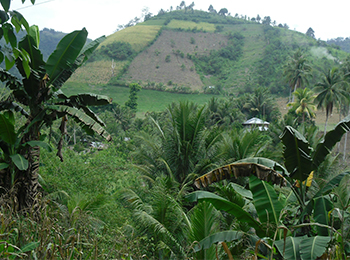About 1 result/s

-
Volume 4, Issue 1, April 2021
This study assessed the climate trends, changes, impacts, and adaptation strategies of farm households in five barangays in the Roxas mountain range, Koronadal City, South Cotabato by using household survey data from 265 respondents, and complimented with focus group discussions, and key informant interviews. The findings of the study revealed that climate changes are manifested by floods, landslides, and droughts as experienced by the local people which caused devastation and affected socioeconomic and environmental conditions of farming livelihood. Farmers used to have bountiful harvests, however, this situation recently changed due to the increasing climate-related risk events. The existing adaptation strategies are just stop-gap solutions that address the effects of climate change, but do not consider the root causes. To consider future changes in climate patterns, the socioeconomic and political structure and processes of the communities need to change by addressing multifaceted drivers of climate change hazards and their impacts. Some grassroot-level transformative adaptation strategies identified in the study consisted of socioeconomic facets, specifically, investment in children’s education, financial management, family planning, and development of alternative on-farm and nonfarm livelihood options. The environmental aspect, including the promotion of agroforestry system, water impoundment technologies, and advanced early warning system, were also considered.

-
Volume 4, Issue 1, January 2021
The Philippines is one of the countries
highly vulnerable to climate change, and this condition threatens further the meager
agricultural production in the country. However, while the Philippines has
established the institutional foundations linking climate change to agriculture,
through policies and legislation, advances in climate change adaptation have
been slow, especially at the local level. This paper demonstrated that this gap
in policy formulation and actual implementation stems from the lack of institutional
analysis in CCA efforts in the Philippines. The paper concludes that along with
the scientific and technological discussions, institutional conversations
should be among the initial vital steps in CCA planning, and policy and
decision-making. It further advocates that institutional analysis can be the
entry point for designing reforms toward effective CCA implementation.

-
Volume 3, Issue 1, August 2018
In 2013, Super Typhoon Haiyan, one of the strongest tropical
cyclones to impact the Philippines, made landfall in Tacloban City. The typhoon
incapacitated the city, breaking down its main lifeline, the transport system.
This article analyzes how a weakened transport system exacerbates disaster
vulnerability, specifically manifested in the restricted mobility and access of
people and communities immediately after an extreme event.
-
Volume 3, Issue 1, February 2018
Tacloban, Philippines, the city most devastated by typhoon Haiyan in 2013, faces severe water supply constraints, particularly on the relocation sites that are expected to accommodate 40% of Tacloban's population by 2018. This study assess the impacts of climate change on the hydrological system on which Tacloban relies for water supply purposes.
-
Volume 2, Issue 2, July 2017
Vulnerability to flooding due to climate change results in limited access to resources, soil erosion and/or deposition, and reduced quality of water supply among others, affecting many farming communities. Recognizing the need to assess and better understand the adaptive capacity of farming communities, this study determined the effects of flooding and assessed the adaptive capacity levels of farming households in Mabitac, Laguna, Philippines as a case.
-
Volume 2, Issue 2, July 2017
The very real threat of climate change requires effective disaster risk management (DRM), especially in highly vulnerable ecosystems such as island communities. Past disaster experiences in different parts of the world have revealed the importance of integrating traditional ecological knowledge (TEK) with scientific fndings in managing disaster risk.
-
Volume 2, Issue 1, November 2016
Recently, corn farmers in Abuan Watershed and Isabela Province are experiencing declining crop yields caused by insufficient amount of rainfall. To increase crop yields and reduce production risks, research on better use of available rainfall and better understanding on effects of climate variability, and soil and field management on crop production is imperative.
-
Volume 2, Issue 1, November 2016
Lately, the humanitarian community has been utilizing crowdsourcing to facilitate medical and disaster response. Grounded in Geiger et al.’s (2011) Crowdsourcing Information Systems (CIS) and Suroweicki’s (2004) Wisdom of the Crowds (WC), this study content-analyzed 23 humanitarian crowdsourcing websites to find out how crowdsourcing has enabled medical and disaster response, as evident in global humanitarian movements from 2010 to 2014.
-
Volume 1, Issue 1, January 2016
Climate-related hazards can lead to disasters in communities with lower socioeconomic conditions, inadequate access to basic social and infrastructure services, and poor institutions. The impacts of Typhoon Haiyan that struck the Philippines in 2013 not only highlighted the exposure of several cities but also indicated the underlying causes of their social vulnerability to climate-related hazards.
-
Volume 1, Issue 1, December 2015
The destruction left by Typhoon Haiyan in the Philippines highlighted not only the exposure of the country but also the underlying vulnerability of barangays (villages) to climate-related hazards. This study utilized Geographic Information System (GIS) to characterize social vulnerability to climate-related hazards of barangays of Tacloban City and Ormoc City using a modified social vulnerability index (SoVI).